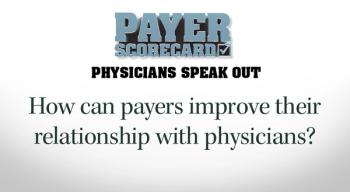
The annual exam is significantly underutilized but provides opportunity for both physicians and patients to make preventive care a priority.

The annual exam is significantly underutilized but provides opportunity for both physicians and patients to make preventive care a priority.

How can payers improve their relationship with physicians?

Get the most out of nurse practitioners, physician assistants, and others to truly benefit your practice’s bottom line and patient care.

Learn four key strategies to prepare for and leverage topped out measures to maximize reimbursement under CMS’s Quality Payment Program.

Don’t let inaction on your part result in lost Medicare revenue. Know the major changes in the MIPS program for 2018.

Many physicians hire family members as employees in both clinical and non-clinical roles at their practice, but there are serious downsides.

Before joining a virtual group to report quality metrics, make sure to pick the right partners

You truly have to walk a mile in a patient’s shoes to find out the true barriers to improving their well-being.

Partnership of six associations aims to give private practices a voice in changing healthcare environment.

The Joint Commission’s “misconceptions” on pain just don’t make sense as many see it as the key to today’s opioid crisis.

Physicians are willing and able to care for the underserved, the needy, and the vulnerable, but are being replaced by lesser trained providers to save money.


Outside the media spotlight, many primary care practices face the basic challenge of staying afloat financially.

No one likes to fire an employee, but if someone is dragging down the practice, it’s time to make a change

Value-based care and related metrics are one more thing physicians don’t need to deal with. Here are three possible solutions to make things easier.

One physician offers advice to peers to make value-based care work at private practices, and perhaps even see financial gains.

A bipartisan bill introduced in Congress in January could help improve patient care while saving doctors time by allowing for electronic prior authorizations of Medicare Part D prescriptions.

Physicians constrained when payers put cost above care

Prior authorizations have always been a source of frustration for physicians, but a new industry effort that includes medical groups and insurers has been established to try to streamline the process.

One of the missions of health insurance providers is to ensure patients have access to effective, quality, evidence-based care. Clinical practice guidelines support the practice of evidence-based medicine, and are typically derived from recognized scientific sources such as specialty societies and are updated annually.

ChangeMaker Ira Rubin, MD, and his son, Zachary, discuss the value of reaching out to young people interested in medicine to make today’s students tomorrow’s physicians.

"It's an occupational hazard now. I've been diagnosed with 'Prior Authorization Elbow.'"

In between the headache that is healthcare for physicians these days, Medical Economics has tried to insert some laughter into the crazy and hectic lives of our readers through our Funny Bone Comics. Click through to see which cartoons you got the most joy and laughs from this past year.

An inside look at what drives insurers to refuse to negotiate, require more prior auths and deny claims

Despite recent moves to streamline the prior authorization process, physicians still struggle mightily as they jump through payers’ hoops.